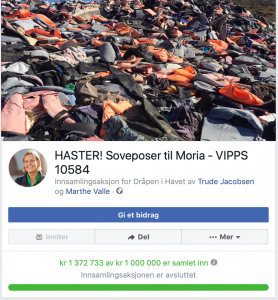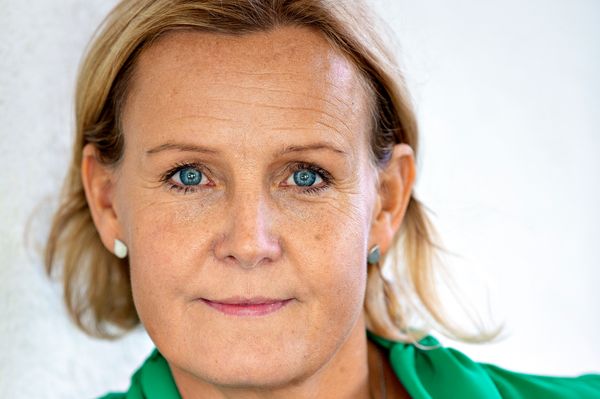
Special Focus: Charities turn to digital for fundraising in corona times
May 6, 2020
Expert View: High-net-worth research provides clues to unlocking wealthy donors during Covid-19
May 21, 2020Photo Credit: Svein Finneide
Born on Facebook, A Drop in the Ocean (Dråpen i Havet) continues to raise almost half of its total income through the platform. Fundraising Europe interviews founder Trude Jacobsen about what led her – a Norwegian in the telecoms industry – to set up the refugee aid organisation and how important Facebook is for the organisation’s fundraising.
[Fundraising Europe] What inspired you to set up A Drop in the Ocean?
[Trude Jacobsen] Having lived in Greece for 8 years, I’d seen huge numbers of migrants arriving on the islands from Turkey. In 2015, I travelled to Lesvos from my home in Norway taking supplies with me for the refugees. I set up a Facebook group to document my time and, in just three days on the island, I saw a huge response from the public: more than 11,000 Facebook followers, many of whom wanted to help, to collect clothes and supplies or to come and help out on the island. I had to do something. I quit my job and went back to Norway to set up what was to become A Drop in the Ocean.
With support from friends and family organising the group and mobilising our volunteer workforce, we then became an official humanitarian organisation. Over the years, around 7,000 volunteers from 70 nations have worked with us.
What does the organisation do?
With the largest camp site set up in Moria (Lesvos), we’re most active there, but our work covers four sites in Greece, reaching a total of 30.000 refugees in different ways. Our services have evolved over time, adapting to refugees’ changing needs. We have a clear strategy for our humanitarian work, but it’s also important for us to be flexible and to be able to move quickly when things change.
Initially, our focus was on finding new solutions for the distribution of refugee supplies, making shops and even developing a cryptocurrency – a digital system that enables people in the camps to ‘buy’ their own items, trying on clothes and so on. This structure has been so important not only in distributing goods, but in giving people their dignity. We provide education too and our recent focus has been on language and computer training.
The coronavirus is a real worry for migrant camps. In such a crowded environment, where people are often unwell and have little chance of social distancing, any virus can spread quickly. With the whole country currently in lockdown, we only have a limited workforce in Greece. Our main focus during this crisis has been to distribute antiseptic gels, face masks and gloves to help protect refugees from COVID-19. We also provide food baskets, medication, diapers, clothes and other supplies to people in the camps, through our resident volunteers living in the camps. In addition, we have set up remote language training groups.
How important is Facebook for your fundraising?
Without doubt, Facebook has been our most important fundraising channel. We started using Facebook’s fundraising tools in December 2017 and by last year almost half (45%) of our total income has come through the platform.
It works really well for us because we have such an engaged audience on the platform. With so many people travelling to the camps and experiencing our work as volunteers, they really understand the work we do, they document how the funds are used and are the strongest advocates for our work. We use Facebook centrally, but we also encourage people to set up their own Facebook fundraising campaigns, which work really well.
We always encourage people to share some information about themselves, telling us their birthday and giving us a clearer idea of how they want to hear from us. This allows us to approach them in the run up to their birthday and invite them to do their own birthday campaign. We now have 75 ongoing birthday fundraising campaigns and these are hugely important for us.
Using Give Panel, we can thank everyone who gives, engaging with them all. It also gives us a clearer idea of how people are using Facebook.
 What campaigns / activities have worked particularly well on Facebook and what hasn’t?
What campaigns / activities have worked particularly well on Facebook and what hasn’t?
We’ve been doing this for several years, but it’s not always easy to know what campaigns or messages are going to get the best response.
Our most successful Facebook fundraising campaign took place in January 2019. In fact, it was a campaign that I hadn’t even planned. I’d just returned from visiting the camps in Lesvos, where it was freezing cold and I’d seen how many people didn’t have sleeping bags or blankets. So, before I caught a flight home, I set up a private fundraiser on Facebook explaining the situation and sharing pictures.
By the time I switched my phone back on after the flight, the campaign had yielded a phenomenal response. Within a few hours, I’d used the initial funds raised to place an order for 1,000 sleeping bags and shared the update with the group. The public’s response continued to escalate. I asked a famous singer to support the campaign and this gave it an extra boost – in just three days the campaign had gone viral! We had collected almost €150,000 – one quarter of the charity’s total annual income.
Again, last month, as news about the coronavirus escalated, a huge number of our supporters wanted to do something to help the refugees in our camps. Several musicians decided to perform online from their homes, encouraging their fans to donate to our cause and this was hugely successful. In the end, we raised twice as much during April as have done in any month before. We didn’t drive those campaigns, but we made sure we had a team ready to support them, sharing their initiatives, this really helped to maximise those appeals.
I genuinely believe that best campaigns aren’t necessarily the ones that have a big marketing budget behind them, but those that tell a real, personal story; one that resonates with others and encourages them to get behind it.
What other fundraising channels do you use?
While Facebook has been important for us since the word ‘go’, it’s important to use a mix of channels. In Norway, we run SMS appeals and mobile donation systems, Vipps and Spleis. We also are working with our one-off donors to try and encourage them to become regular supporters. Both the telephone and door-to-door channels have been successful in helping us achieve this.
But it’s digital channels that we’ve really embraced – it really helps us to quickly and easily reach and engage our supporters across the world.
About Trude Jacobsen
Norwegian mother of five, Trude Jacobsen set up the humanitarian organisation A Drop in the Ocean (Dråpen I Havet) after a short trip to Lesvos in Greece during late summer 2015. With a professional background in customer service management, Trude had worked for several years in both Greece and Norway. She holds a university degree within organisation and relations management in tourism, specialising in crisis management for tourist destinations.




